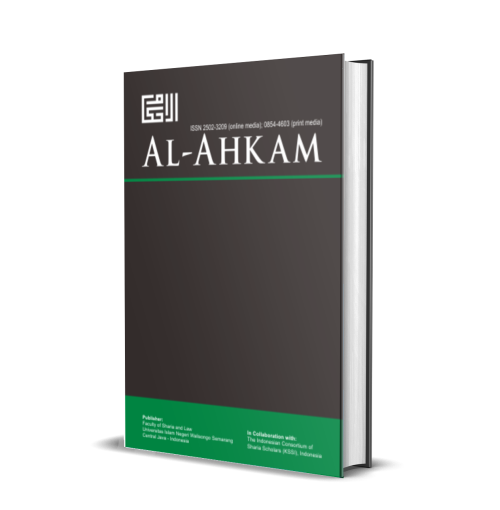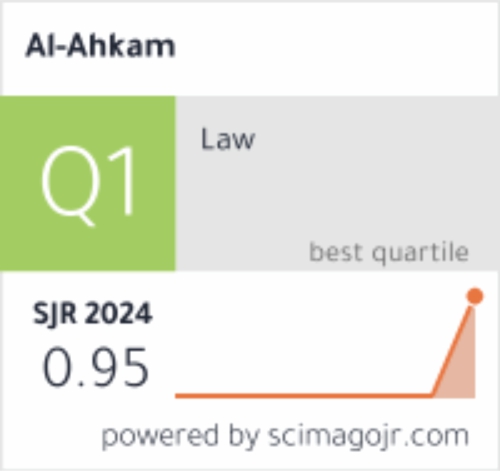Ruler of Interests, Political Interests, or Law Enforcement: Case Study of Amnesty Plan for Din Minimi Group in East Aceh
DOI:
https://doi.org/10.21580/ahkam.2018.18.2.2420Keywords:
amnesty, political interests, law enforcementAbstract
The aim of this paper is the concept of the settlement of criminal cases committed Din Minimi Group. The amnesty is the prerogative of the President specified in the Constitution of 1945. Amnesty NRI is a form of pardon to political prisoners to be free from legal sanctions. The legal basis for amnesty stipulated in the Emergency Law No. 11 of 1954 on Amnesty and Abolition. The method used in this paper is a conceptual approach. Related to peace efforts in Aceh, the President has issued Presidential Decree No. 22 of 2005 on Amnesty and Abolition against GAM members. Once that happens again insurgency by Din Minimi caused dissatisfaction with the policy of the Governing of Aceh. Counterinsurgency is done by giving amnesty to the group Din Minimi so willing to surrender. When viewed in this aspect of the law, amnesty if forced to give to Din Minimi, it is destructive to the prevailing laws in Indonesia. Do not rule out the possibility of regulation will hit Indonesia polemic, so the solution had to pay attention to various aspects of both of the victim, the offender, and the community by not disregard the rule of law and justice.
Downloads
References
Anonimous. “Mempertimbangkan Amnesti bagi Tahanan Politik Papua.” Jakarta: Kontras, n.d.
Asshiddiqie, Jimly. Konstitusi dan Konstutionalisme Indonesia. Jakarta: Sinar Grafika, 2010.
Darmanto. Sistem Administrasi Negara Kesatuan Republik Indonesia. Jakarta: Universitas Tebuka, 2007.
Deliani, Dhian. “Pelaksanaan Kekuasaan Presiden dalam Pemberian Grasi: Studi terhadap Pelaksanaan Pemberian Grasi oleh Presiden Susilo Bambang Yudhoyono Tahun 2004 s/d 2010.” Thesis, Fakultas Hukum, Program Pascasarjana, Universitas Indonesia, 2011.
ELSAM. “Impunitas.” ELSAM - Referensi HAM, 2014. http://referensi.elsam. or.id/2014/09/impunitas/.
Ghofar, Abdul. Perbandingan Kekuasaan Presiden Indonesia setelah Perubahan UUD 1945 dengan Delapan Negara Maju. Jakarta: Kencana Prenada Media Group, 2009.
Hafil, Muhammad. “Din Minimi tetap Diproses Hukum.” Republika.co.id, 2015. https://www.republika.co.id/berita/koran/hukum-koran/15/12/30/o05v8d1-din-minimi-tetap-diproses-hukum.
Hasyim. “Amnesti untuk Din Minimi Hancurkan Reputasi Aceh.” Serambi Indonesia - Aceh.Tribunnews.com, 2016. http://aceh.tribunnews.com/ 2016/01/02/amnesti-untuk-din-minimi-hancurkan-reputasi-aceh.
“Indonesia: Averting Election Violence in Aceh.” International Crisis Group, 2012. https://www.crisisgroup.org/asia/south-east-asia/indonesia/ indonesia-averting-election-violence-aceh.
“Indonesia: GAM vs GAM in the Aceh Elections.” International Crisis Group, 2011. https://www.crisisgroup.org/asia/south-east-asia/indonesia/ indonesia-gam-vs-gam-aceh-elections.
Manan, Bagir. Lembaga Kepresidenan. Jakarta: FH UII Press, 2003.
Marpaung, Leden. Asas-Teori-Praktek Hukum Pidana. Jakarta: Sinar Grafika, 2009.
Nivada, Aryos. “Amnesti bagi Din Minimi, Layakkah?” aceHTrend.com, 2016. https://www.acehtrend.com/2016/01/04/amnesti-bagi-din-minimi-layakkah/.
Peuhaba. “Riwayat Lengkap Din Minimi di Aceh.” Dєtik Sєmαѕα, 2015. https://seaceh.wordpress.com/2015/03/27/riwayat-lengkap-din-minimi-di-aceh/.
Prang, Amrizal J. “Kontroversi Diskursus Amnesti Din Minimi.” Serambi Indonesia - Aceh.Tribunnews.com, 2016. http://aceh.tribunnews.com/ 2016/01/19/kontroversi-diskursus-amnesti-din-minimi.
Pratomo, Aditya. “DPR Sambut Baik Pemberian Amnesti Din Minimi.” Sentananews.com, 2016. http://sentananews.com/news/news/dpr-sambut-baik-pemberian-amnesti-din-minimi-13233.
Prawira, Indra. “Amnesti dan Abolisi dari Perspektif Hukum Tata Negara.” In Seminar Pengusulan Syafrudin Prawiranegara sebagai Pahlawan Nasional, Bandung, 16 Juni 2009. Bandung, 2009.
“Prerogative | Definition of Prerogative.” Merriam-Webster. Accessed May 8, 2016. https://www.merriam-webster.com/dictionary/prerogative.
Priyanto, Dwidja. Sistem Pelaksanaan Pidana Penjara di Indonesia. Bandung: Refika Aditama, 2009.
Ranadireksa, Hendarmin. Visi Bernegara Arsiktektur Konstitusi Demokratik. Bandung: Fokus Media, 2009.
Ritonga, Abdul Rahman. Ensiklopedi Hukum Islam. Jakarta: Ichtiar Baru Van Hoeve, 1997.
Safrizal. “Janda Tentara Korban Pembunuhan Din Minimi Akan Jumpai Presiden.” AJNN.net - Portal Berita Aceh, 2016. http://www.ajnn.net/ news/janda-tentara-korban-pembunuhan-din-minimi-akan-jumpai-presiden/index.html?D22901.
Ash-Shiddieqy, Teungku Muhammad Hasbi. Filsafat Hukum Islam. Jakarta: Bulan Bintang, 1975.
Soekanto, Soerjono. Pengantar Penelitian Hukum. Jakarta: UI Press, 1986.
Susetyorini, Herawati. “Perbandingan Teori Pemidanaan Menurut Hukum Pidana Islam dan Kitab Undang-Undang Hukum Pidana (KUHP).” Thesis. Universitas Muhammadiyah Malang, 2004. http://eprints.umm.ac.id/ 19720/.
Syafiq, Ahmad. “Rekonstruksi Pemidanaan dalam Hukum Pidana Islam (Perspektif Filsafat Hukum).” Jurnal Pembaharuan Hukum 1, no. 2 (August 1, 2014): 178–90. https://doi.org/10.26532/jph.v1i2.1484.
Tim Liputan BBC News Indonesia. “Kelompok Eks Kombatan GAM, Din Minimi Menyerahkan Diri.” BBC News Indonesia, 2015. https://www.bbc. com/indonesia/berita_indonesia/2015/12/151229_indonesia_kelompokdimini_menyerah.
’Ulya, Zaki. “Refleksi Memorandum of Understanding (MoU) Helsinki dalam Kaitan Makna Otonomi Khusus di Aceh.” Jurnal Konstitusi 11, no. 2 (2014): 371–92. https://doi.org/10.31078/JK%X.
Downloads
Published
How to Cite
Issue
Section
License
By submitting an article to the journal, the author(s) agree to transfer the published article's copyright to the journal, which will act as the publisher. This means the journal will have the right to publish the article in various forms, including reprints. The journal will maintain the publishing rights to the published articles.
In line with the license, authors and third parties (readers, researchers, and others) are allowed to share and adapt the material. In addition, the material must be given appropriate credit, provided with a link to the license, and indicated if changes were made. If authors remix, transform or build upon the material, authors must distribute their contributions under the same license as the original.




